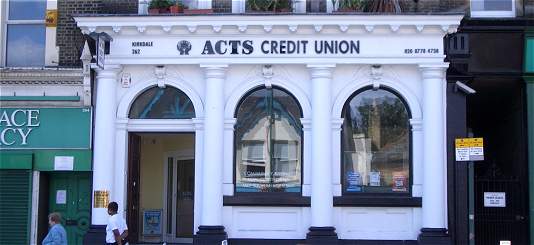|

The closure of the Sydenham branch of Barclays Bank and
its reopening as the ACTS Credit Union, opposite the Greyhound, set me thinking
about the colourful career of one of its former employees. During the 1880s the
bank was known as the London & South Western Bank (it was taken over by
Barclays in 1918) and its manager was Theophilus William Williams, a man
described (perhaps with some exaggeration) as "the biggest crook the borough
has ever known". He was also, for many years, the most powerful political
figure in Lewisham (one account describes him as "virtually
dictator").
Williams came from humble origins. He was born in East
London in about 1843. It seems he came to south London to work as a bank
messenger with the London & South Western Bank. He became a clerk, and
finally branch manager. By 1875 he was living at Shirley House, 133 High Street
(now Dartmouth Road, on the site of Sydenham School). At this time he was the
manager of the Forest Hill branch of the London & South Western Bank. This
was not the present Barclays Bank, which was not built until 1911, but was at 4
Dartmouth Road, a building that still survives as a florist’s shop. By the
early 1880s Theophilus had become manager of the Sydenham branch of the London
& South Western Bank. He had also moved house, to Borrowdale, 13 Westwood
Hill (this still survives, on the corner of Lawrie Park Gardens).
He was a Congregational lay preacher at the Church in
the Grove (now the Grove Centre in Jews Walk) during the 1870s and, apparently,
could draw large crowds. However, it was in local politics that he used his
oratorical skills to best effect, and through which he pursued his ambitions.
In 1876 he was elected to the Lewisham Vestry, and was elected to the Lewisham
Board of Works the following year. In 1882 he became Chairman of the Board of
Works, a position he held until the board was dissolved in 1900, when the
Metropolitan Borough of Lewisham was formed. He was then elected Mayor of
Lewisham and, in 1901-1902, served a second term in that office. During this
time he represented Sydenham on the council. For twenty years, between
1882-1902, he was the most powerful politician in Lewisham. He was also a
magistrate, and he represented Lewisham on the LCC.
During the mid 1880s Williams retired from the bank
and became proprietor of the Kentish Mail, a small chain of local newspapers. A
sympathetic newspaper is perhaps the most useful aid an ambitious politician
can have.
It is clear that Williams was a persuasive public
speaker, and a person of some charm and charisma. Many years later a former
employee described him as "a dominating personality … (with) tremendous
charm and forcefulness". He was a veritable model of the Victorian self-made
man, with a seemingly selfless devotion to public service. It was during his
second term as Mayor, however, that "unwholesome rumours" began to circulate
about his private life.
In fact, Williams was not self-made. Other people paid
for his respectability and extravagant lifestyle. Through fraud and
embezzlement he persuaded them to part with their money. He had, after all,
been a bank manager, and people trusted him. He spent both his wife and
sister-in-law’s inheritance, under the guise of managing it. He was the
trustee of a widow, and lost her money; he embezzled his employees out of their
savings (it was claimed he forced them to invest in his companies as a test of
loyalty).
It was not until 1908 that matters finally came to a
head. He was summoned to appear at Lambeth County Court to face bankruptcy
proceedings. The investigation was impeded because Williams had burnt most of
his business records. It is clear that his business affairs were highly
irregular, involving his use of false names; business colleagues who had died,
gone missing, or whom he simply couldn’t remember; loans to himself from
trusts he was managing and gifts to people whom he "didn’t know". During
the proceedings Williams attempted to flee to France, but was recognised and
arrested at Liverpool Street Station.
As a consequence of his bankruptcy examination he was
summoned to appear at the Greenwich Magistrates’ Court (where he himself
had been a magistrate) to answer charges of obtaining money under false
pretences.
However, the case never came to court. On the day of
his trial, 11 Nov 1908, the magistrate was informed that Williams was dead. The
inquest was held a few days later. Williams had taken an overdose of morphia
(it seems that he was a regular user of this drug, at least during the last
weeks of his life) and the jury returned a verdict of "suicide during temporary
insanity". The coroner quibbled with this and the agreed verdict was "death
from an overdose of morphia, self-administered". This avoided the stigma of
suicide – clearly an attempt by the coroner to save something of the
reputation of the former mayor and magistrate.
This was not the end of Theophilus William Williams.
His name lives on, particularly in Sydenham and Forest Hill. It is to be found
on the foundation stones of Forest Hill Library, Forest Hill Swimming Baths,
and the Jews Walk fountain. Elsewhere in the borough it is on the foundation
stones of the old Lewisham Central Library and Ladywell Swimming Baths. It is
ironic that a man so corrupt should leave behind such a worthy legacy.
© Steve Grindlay
Historian to the Sydenham
Society
First published as a part of Steve's Jottings
Jews Walk Fountain
Have you got news or views on
this?
We reserve the right to edit and publish feedback unless
it is marked <not for publication>. For your security we will *never*
publish full names or email addresses or use an email address for any other
reason than responding to your submission without your express
permission.
|